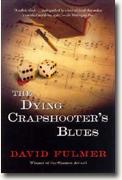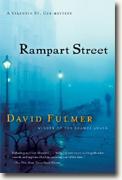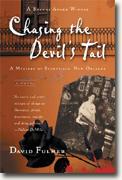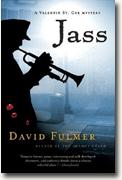author interview
book reviews:
· general fiction
· chick lit/romance
· sci-fi/fantasy
· graphic novels
· nonfiction
· audio books
· author interviews
· children's books @
curledupkids.com
· DVD reviews @
curledupdvd.com
newsletter
win books
buy online
links
home
for authors
& publishers
for reviewers

|
|||||
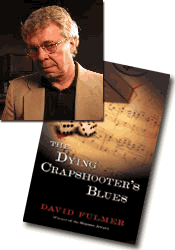 
[Shamus Award-winning author David Fulmer shares his insights into Prohibition, music, class and crime in 1920's Atlanta with curledup.com's Luan Gaines] Interviewer Luan Gaines: What was your inspiration for The Dying Crapshooter’s Blues? David Fulmer: It’s the title of a song written by Blind Willie McTell. The song is a version of a 300-year-old ballad cycle that began as “The Unfortunate Rake” and then got turned into songs like “St. James Infirmary” and “The Streets of Laredo.” McTell takes what he says is a true story as the basis for his version. That crime is at the center of the plot of the book. By the way, the song appears on McTell’s “Atlanta Twelve-String” and “Last Session” CDs. In this novel, you move from the familiar streets of the District in New Orleans to prohibition Atlanta, Georgia. Why did you choose Atlanta for the setting of your new novel? Atlanta was a jumping town in the 1920s. In terms of music, it was one of the first recording centers. If you wanted to make a record, you went to New York, Chicago, or Atlanta. It had an active crime element, a corrupt police force, and it was a racial melting pot. A good stage for a story, in other words. Joe Rose is a sympathetic character, undoubtedly part of the criminal element. Like Valentin St Cyr from the New Orleans novels, Rose is of mixed race. How does this fact enable him to navigate different levels of society as an effective protagonist? Actually, Joe’s race is never clear, because he doesn’t know, though he’s probably Native American. The lack of clarity means he can move around a little, though it’s true that if he tried to enter the upper levels of “proper” society, he’d be rebuffed, unless he could provide proof he wasn’t a person of color. I think it works as a device, because anyone can identify with him. There is music playing in the background of your novel, as Willie McTell composes a ballad for the dying Little Jesse Williams, shot down in the street by a drunken cop. How does Little Jesse’s death serve as a catalyst for Joe’s involvement? Joe knows Little Jesse from being around the streets. Jesse makes a deathbed plea that Joe get to the bottom of his shooting. Superstition trumps; you can’t say no to a dying man’s last request.
He begins to wonder about halfway through. Joe’s the type who doesn’t much believe in coincidence, and the two events occur close together, which makes him suspicious right off the bat. As the narrative progresses, the suspicion grows. Joe is crazy about Pearl Spencer, but not blinded to her talent as a thief. How does Pearl’s possible connection to the theft at the mansion complicate Joe’s investigation? It’s another cook in the kitchen. That’s one thing. That Joe has this attraction to her makes it doubly complicated for him. That her brother Sweet can’t stand the idea of the two of them together makes it triply complicated. So he has some to thread some needles with his investigation. Joe Rose realizes that the roles he plays, detective, sneak thief, lover of women, have nothing to do with real life. What angst drives Rose and what is he looking for? It’s not that it has nothing to do with real life. Because crime – and getting caught - is no joke. It’s that it’s he uses his talent to steal, just as his wicked way with women is how he to avoids romantic entanglements. As far as what drives him, he doesn’t know, and that’s beginning to get to him. Keep in mind that he’s a World War I veteran, and rootless wandering is a regular symptom for some war veterans. How do Rose’s earlier connections to the police department and as a Pinkerton aid in his investigation of Little Jesse’s shooting? While he gets some help from the Atlanta PD, he also meets with resistance. Why? He was a police officer for a short time and a Pinkerton detective for a shorter time. So he’s not a particularly astute investigator. But he knows all the principles, he’s a thief by profession, and he’s got help from his friend Albert Nichols, so when he gets leaned on from two directions to get to the bottom of it, he’s got some options.
They’re assembled from spare parts. That’s generally how I build characters. I start with the essentials, like one of those figures for modeling clay. Then I start adding layers by way of back-stories and quirks from people I’ve met throughout my life, with the hope that the character will be fully dimensional when I’m finished. You have a special talent for stripping away the façade and revealing the truth behind the mask of civility, in this case 1920’s Atlanta. What does this microcosm of the country reveal about the American psyche during Prohibition? It was one of those times when society was in serious tumult. Everything changed in the aftermath of WWI. The world was a different place. It was a general loss of innocence, because wars had a sheen of glory, real or imagined. That was gone in a meaningless slaughter that included the first use of poison gas. Prohibition was a disaster that proved that morality couldn’t be legislated and in fact the cure was worse than the illness. So this disillusionment set in. That’s the stage Joe and the other characters inhabit. In The Dying Crapshooter’s Blues, women have finally gotten the vote and with it more opportunities. How does this freedom affect the ladies associated with men like Joe Rose? Joe is the type that loves libertines. He is a tomcat, sexually driven, and really enjoys and appreciates women. He is not at all threatened by their newfound liberation. In fact, he loves it. Women are willing to opening drop their Victorian chastity belts and that’s good news for him. The bad news is that it gets him in trouble, too. Class becomes an issue in 1920’s society, law enforcement doing the bidding of the rich, a criminal element with their own set of mores. Can you speak to this class separation and how it influences police work? Is there much difference between the ‘20s and today? Class issues will never go away. There will always be a group of haves exploiting the have-nots. And the have-nots will be there to be exploited. There will also always be an outlaw element, whether it’s the flappers, the Lost Generation, beatniks, Hell’s Angels, hippies, punks, or gangstas. As well as lone wolf gypsies like Joe Rose.
Her “problem” – which might be nymphomania or just a hyperactive sexual appetite - has not yet caught up with the other political freedoms women gained. May Ida is a natural force trapped inside a conventional straightjacket, which is what causes the mental and emotional fissures. And because of those fissures, she’s both an asset and a threat as he tries to unravel the two crimes. Captain Jackson’s wife, May Ida is his polar opposite. How does each benefit from the marriage? It’s an arranged marriage and a disaster. The Captain is a cold, unforgiving man with a minimal sex drive. May Ida is completely sensuous, and would simply enjoy her overheated sexual hunger if the constraints of proper behavior weren’t making her crazy. If she had lived anytime from the ‘60s on, she would have simply been a happy eccentric. As it was, she might be destroyed by her appetites. The Captain is an intimidating, dark-humored individual, full of vindictiveness. Is the department more or less effective under his autocratic leadership? How does the endemic corruption of the era affect the department? Like most police departments in these decades, Atlanta’s was rife with corruption, and the Captain seems to grow in this swamp. He’s a sociopath, and we’ve seen from history that people like that are black holes that seem to suck energy out of the air and use it to fuel their cancers. Because he’s willing to do anything to further his means, he is a valuable tool. He’s a bully, but like most bullies is also a coward, and doesn’t have the force of character or the smarts to take over. Like most police departments in these decades, Atlanta’s was rife with corruption. In a subplot, Jake Stein and George Purcell bring together Atlanta’s offbeat musical talent, folks who play working people’s music. Why is Blind Willie McTell the only black man to audition? What are the racial barriers he faces in that endeavor? As a transportation and business hub, Atlanta was the most important urban center in the South. It was also an early recording center. It was also a progressive city, though not so progressive as to be integrated. This was the beginning of the “race record” era, and musicians were segregated when it came to recording. Purcell (who was based generally on the great Ralph Peer) and Stein didn’t think to specify and so Willie finds himself on the wrong side of the color line.
It’s true that it’s an ancient tradition. Before cultures became literate they were oral. The ear predates the eye in passing on information from person to person and generation to generation. McTell carries that on, specifically in this case. He takes a chord structure and applies his own lyrics, which he claims were derived from an actual incident. In fact, he recounts the whole incident before playing the song on his “Last Session” album. In any case, I wanted to present the creation of that song in just that way. A real incident turned into myth. You obviously have a deep appreciation of jazz and the blues of this era. Can you share some of your interest in music with us and how it has shaped your writing? Almost everything I write has a soundtrack playing, or has musicians as characters, or is set against the backdrop of a musical genre. Or all of the above. I was the little kid with the transistor radio stuck to his ear. I went backwards from rock and roll to the roots. And I love being able to present these little vignettes about American music as part of my books. As Pearl and Joe end the tale hand-in-hand, I can’t help but think there will be more in this series. Do you have a sequel planned to The Dying Crapshooter’s Blues? If so, can you share something about it? Right now, there’s no sequel planned. I have two more Storyville books to write. I also have two finished novels and two that are close that I plan to publish. So maybe we’ll see Joe in action again, but right know I don’t know. And when can we expect another Valentin St. Cyr novel? I’m working on it as we speak. It’s due for release in January of 2008. The title is Lost River. The final book in that series will come out in January 2009. David Fulmer's Shamus Award-winning first novel, Chasing the Devil's Tail, was a Los Angeles Times Book Prize nominee. He has written about blues, jazz, and other subjects for Atlanta Journal & Constitution, Atlanta Magazine, Southline, and National Public Radio, and he wrote and produced the acclaimed documentary Blind Willie's Blues. He has also worked as a welder, bartender, musician and teacher, and spent ten years in the motor sports industry. A native of Pennsylvania, he lives in Atlanta, Georgia. Contributing reviewer Luan Gaines interviewed David Fulmer, author of The Dying Crapshooter's Blues (see accompanying review), about his book via email for curledup.com. Luan Gaines/2005.
|
|||||
| fiction · sf/f · comic books · nonfiction · audio newsletter · free book contest · buy books online review index · links · · authors & publishers reviewers |
|
| site by ELBO Computing Resources, Inc. | |

